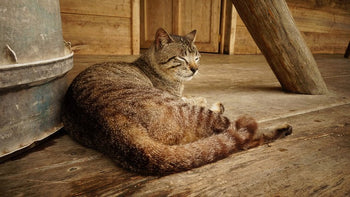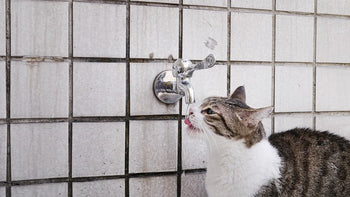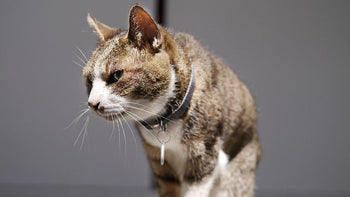As a pet owner, you probably adore your furry friend, but let's be honest: pet odor can be a challenge. Whether it's from a litter box, a playful dog that loves rolling in the grass, or simply the natural smell of pets, keeping your home fresh can seem impossible at times. One solution that many pet owners are turning to is air purifiers. But do air purifiers really help with pet odor? In this blog post, we'll explore the effectiveness of air purifiers in tackling pet smells, as well as other benefits they offer. Additionally, we’ll introduce another helpful product for pet owners—a dog water fountain, which can keep your pets hydrated while promoting their well-being.

How Air Purifiers Work Against Pet Odor
First, let's break down what causes pet odor. The smell typically comes from pet dander, hair, and even bacteria that collect in your home. Pets, especially dogs and cats, shed dead skin cells (dander) that can get trapped in your furniture, carpets, and air. These particles contribute to that "pet smell" that can linger in your home. Furthermore, pet waste, whether from litter boxes or bathroom accidents, adds to the challenge.
Air purifiers work by filtering the air to remove contaminants, including odors, dander, and even bacteria. But not all air purifiers are created equal—here’s how they work to combat specific pet odors:
1. HEPA Filters (High-Efficiency Particulate Air):HEPA filters are known for trapping tiny particles such as pet dander, dust, and hair. They can capture particles as small as 0.3 microns, which helps in removing the airborne causes of pet odor. However, they don’t necessarily remove odor molecules, so while your air may feel cleaner, the smell might not always completely disappear.
2. Activated Carbon Filters:This is where air purifiers excel in odor removal. Activated carbon filters absorb volatile organic compounds (VOCs) and odor-causing molecules, making them highly effective at neutralizing pet smells. These filters are often paired with HEPA filters for a dual-action approach—capturing both airborne particles and odors.
3. UV Light and Ionizers:Some air purifiers also feature UV light technology that kills bacteria and viruses in the air. While these don’t necessarily remove odors, they help in reducing bacteria that could be contributing to unpleasant smells. Ionizers work by emitting negative ions that attach to particles, causing them to drop out of the air. However, these are less recommended for homes with pets, as they can produce ozone, which can be harmful to both pets and humans.
Other Benefits of Air Purifiers for Pet Owners
Beyond odor control, air purifiers offer several other advantages for households with pets:
1. Allergy Relief:Pet dander is one of the leading causes of allergies, and air purifiers can significantly reduce the amount of dander in the air. This can lead to fewer allergy flare-ups, even for those who don't have a severe pet allergy.
2. Improved Air Quality:Aside from dander, pet homes are often filled with fur, dust, and other airborne particles. By filtering these contaminants out of the air, air purifiers make the air cleaner and healthier for everyone in the household.
3. Reduction of Other Pollutants:Many air purifiers also filter out other harmful particles such as pollen, dust mites, mold spores, and chemicals. This means that, in addition to reducing pet-related allergens and odors, you're also improving the overall air quality in your home.
Choosing the Right Air Purifier for Pet Odor
When selecting an air purifier to tackle pet odor, it’s essential to choose one that has a combination of HEPA and activated carbon filters. Here are a few considerations to keep in mind:
Room Size
Ensure the air purifier’s rated power is suitable for the size of the room where you plan to use it. Larger rooms require more powerful purifiers.
The CADR (Clean Air Delivery Rate) is typically used to determine the appropriate room size for an air purifier. For instance, an air purifier with a CADR of 200 is suitable for rooms up to 300 square feet (about 28 square meters), while a CADR of 300 would be effective for rooms up to 450 square feet (about 42 square meters). If you have a larger living room (like 500 square feet or more).
replacement cost and schedule.
High-efficiency air purifiers often use HEPA filters, which typically need to be replaced every 6 to 12 months, depending on air quality and usage. For example, a HEPA filter for some models might cost around $50. In a home with pets, you may need to replace it more frequently, like every 6 months. Additionally, some purifiers use carbon filters to remove odors (such as pet smells), and these usually need to be replaced every 3 to 6 months, costing around $20 to $40.
Noise Level
Some air purifiers can be quite noisy and may disturb your pets. Look for quieter models that won’t disrupt your household.
Air purifiers' noise levels are typically measured in decibels (dB). For example, 30-40 dB is comparable to a quiet library environment, ensuring it won’t disturb your pets. On the other hand, 50-60 dB is about the level of normal conversation, which may slightly bother sensitive pets. Some quiet-designed purifiers have noise levels as low as 20-30 dB when operating on lower speeds, making them ideal for pet owners, especially for night use.The Uah Pet Air Purifier for Dog and Cat Family is a great example, offering Silent operation <28dB.

Why a Pet Water Fountain Is Also a Good Idea
While you’re upgrading your home environment with an air purifier, don’t forget to consider your pet’s hydration needs. Proper hydration is essential for your pet’s health, and a pet water fountain is an excellent addition to your pet care routine.
Here’s why pet water fountains are beneficial:Pet water fountains attract pets with running water, ensure they have access to filtered, clean water, and reduce the need for frequent refills. They also provide entertainment, making them a practical and fun addition to pet care.
Final Thoughts
Pet ownership comes with many rewards, but managing odor and maintaining a clean home can be challenging. Air purifiers help with pet odor by removing dander, hair, and odor-causing particles, creating a fresher and healthier home environment. When choosing an air purifier, look for a combination of HEPA and activated carbon filters for optimal results.
And while you're improving your home environment, don't forget about your pet's well-being. A dog water fountain is a great way to keep your dog hydrated and healthy, all while making life a little easier for you.
By investing in both an air purifier and a dog water fountain, you can improve the quality of life for both you and your pet, creating a cleaner, healthier, and more enjoyable living space.
















